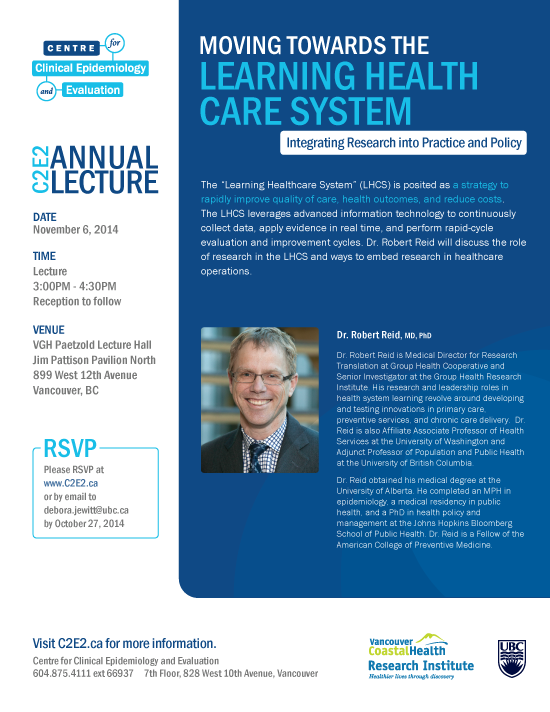
Annual lecture spotlights Learning Healthcare System as effective strategy for improving care quality, health outcomes, and reducing costs.
Individuals wanting to learn more about how practical research can inform real changes in complex and evolving health systems would be well advised to attend this year’s Centre for Clinical Epidemiology and Evaluation (C2E2) Annual Lecture. Guest speaker Dr. Robert Reid is presenting a talk, “Moving Towards the Learning Health Care System: Integrating Research into Practice and Policy”, which will be about the Learning Healthcare System – a strategy posited to rapidly improve quality of care, health outcomes, and reduce costs.

Dr. Reid is the Medical Director for Research Translation at Group Health Cooperative and Senior Investigator at the Group Health Research Institute, both based out of Seattle, Washington. Group Health is recognized as a high-performing health care system in the U.S. and has a long history of delivering population-based care to its enrolled population with ensuring a mission to provide high quality, affordable care.
“I’m a physician and health services researcher but what I’m really interested in is using health services research to change health care delivery,” says Dr. Reid, who is also an adjunct professor at the UBC School of Population and Public Health.
“I’m hoping to impart how practical research can be embedded into health systems that are often complex, evolving, and adaptive, and provide generalizable knowledge around how to change care delivery in those systems.”
Understanding how new interventions and care delivery innovations actually affect people in every-day care settings outside controlled experimental settings is important for policy makers and regional administrators to base decisions, according to Dr. Reid.
“Focusing on outcomes that are meaningful to patients as well as those that are meaningful to health care providers, managers and policy makers who deal with realities of health care are important foci for researchers,” he says.
Lecture relevant to recently released health ministry community care guidelines
Dr. Reid’s lecture is timely as the B.C. Ministry of Health’s guiding framework for the health care system, released last year, set out health care priorities, some of which focus on primary and community-based care, explains C2E2 Director, Dr. Stirling Bryan.
“In particular, one of the priorities is to create community-based inter-professional health care teams as a way of tackling problems in the primary care segment of the health care system as well as bringing about improvements,” says Dr. Bryan.
“Dr. Reid’s area of focus has been in primary and community care reform. That sort of connection with B.C.’s health care objectives, and the work he’s done especially in primary care and around inter-professional (team-based) approaches to providing care, is a good fit.”
“I’m thrilled that Dr. Reid is our speaker this year,” adds Dr. Bryan. “He has a stellar track record both on the health research side and also working in health care administration and decision-making positions within one of the highest performing systems in the U.S. It strikes me that everyone who attends should be able to see some message that’s relevant to their work.”



